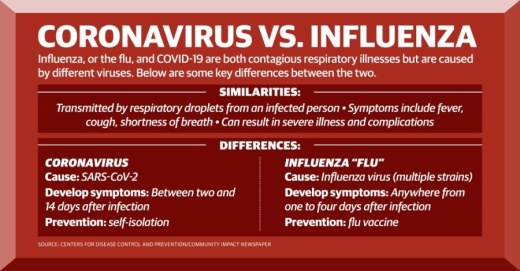Rather, it just is not peak flu season.
Flu activity is minimal at this time of the year, as flu season typically runs from October through May with peaks in January and February, according to the Centers for Disease Control and Prevention website.
The current flu season began Sept. 29, 2019, and while Donovan said the flu does run year-round, it is definitely less prominent in the summer months.
“We are not seeing a tremendous amount of flu,” Donovan said. “The CDC says Texas is minimal or sporadic, and I would say that that reflects what's going on locally.”
According to Texas Department of State Health Services, there were reports of flu-like illness in Williamson County during the week of July 11, but those have not been confirmed with a lab test.
Between Sept. 29, 2019, and July 6, 2020, Texas reported 9,070 deaths from pneumonia and influenza, according to DHSH data. Deaths due to COVID-19 may be classified as pneumonia deaths or influenza deaths—or deaths due to “flu” or “flu-like illness”—in the absence of positive SARS-CoV-2 test results, it said.
As of July 20, there had been 4,020 coronavirus-related deaths in Texas, according to DHSH data.
Donovan added that while at the start of the pandemic in early March, individuals often received a flu test first before a coronavirus test, that is not the case now. This is mostly because we are no longer in the traditional flu season, he said, so while someone may certainly have the flu, it is not near as likely.
Donovan said the flu tends to peak in the winter months, as people are inside more often and are around large groups of people for holiday gatherings and celebrations.
“That's a perfect environment for the spread of the flu virus,” he said.
What’s the difference?
A common misconception is that the novel coronavirus is like the flu.
The two have similar symptoms, such as fever, cough, sore throat and muscle pain. One exception is the loss of taste or smell, which is only tied to COVID-19, according to the CDC website.
Flu and coronavirus are also both viruses that cause respiratory infections, can lead to severe complications and can eventually be fatal.
The biggest difference, though, is that the virus that causes COVID-19 has never before been encountered by the human body, said Elise Huebner, Williamson County and Cities Heath District Epidemiologist said.
“Scientists are working quickly to understand the molecular structure of the virus and the mechanisms of how it causes various symptoms in humans, but much remains unknown,” Huebner said in an email. “There is no widespread immunity to COVID-19. As far as we can tell, anyone who has not had COVID-19 has the potential to become infected with COVID-19. It is a new disease and low percentages of people in communities have built immunity to it.”
In addition, there is no vaccine for COVID-19.
Vaccines stimulate a person’s immune system to produce immunity to a specific disease, which helps protects the person from that disease, Huebner said.
While there is no vaccine for COVID-19, there is one for the flu. And while getting ill with either is not good, Donovan said getting ill with both would be even less so.
“This will be our first real flu season with coronavirus, so I think there are a lot of things about this combination of those two diseases that we just don't yet know,” Donovan said of the upcoming season. “I think we are all concerned for those people who get influenza and coronavirus at the same time, and what's the severity of that disease.”
Since the coronavirus and the flu can coexist, Huebner and Donovan said it is more important than ever that individuals get the flu vaccine.
The flu vaccine can prevent a person from getting sick with the flu, reduce the risk of flu-associated hospitalization and reduce the severity and duration of illness in people who still get sick, Huebner said.
Donovan added that the flu vaccine does not cause the flu.
“There is no association between getting the flu shot and then subsequently developing the disease, except that the flu shot tends to reduce the frequency with which you develop the disease,” Donovan said. “Very often, when people say, 'I got sick anyway,' they did get sick, but they got sick with a non-flu virus, and the flu shot does not help with any virus besides the flu virus.”





